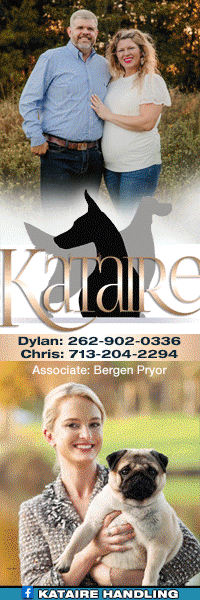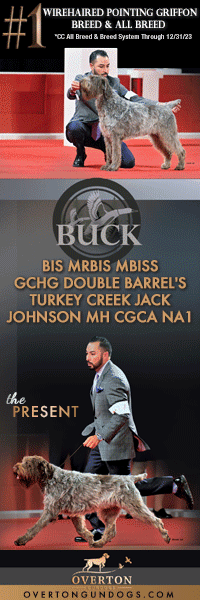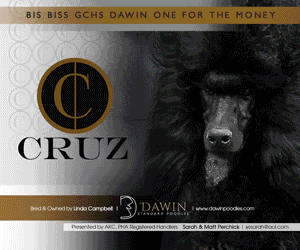Blame It On The Delegates
114 – November, 2010
by Gretchen Bernardi
 “The American Kennel Club is a “club of clubs”, and not a club of individuals. There are over 500 clubs that meet AKC membership requirements and have duly elected or appointed Delegates to represent them at quarterly meetings of the Delegate Body. Each delegate functions as a representative of his or her member club in voting on matters coming before the Delegate Body and electing from amongst their membership the thirteen individuals who serve on AKC’s Board of Directors. Under the Constitution and Bylaws of The American Kennel Club, the Delegate Body “… shall have sole power to make the Rules governing dog shows and field trials and the clubs or associations formed to conduct them.”
“The American Kennel Club is a “club of clubs”, and not a club of individuals. There are over 500 clubs that meet AKC membership requirements and have duly elected or appointed Delegates to represent them at quarterly meetings of the Delegate Body. Each delegate functions as a representative of his or her member club in voting on matters coming before the Delegate Body and electing from amongst their membership the thirteen individuals who serve on AKC’s Board of Directors. Under the Constitution and Bylaws of The American Kennel Club, the Delegate Body “… shall have sole power to make the Rules governing dog shows and field trials and the clubs or associations formed to conduct them.”
This statement from the AKC website needs updating. Currently there are nearly 600 member clubs and that same number of delegates, with one representing each member club. And while it is true that the AKC remains a club of clubs, there is increasing talk recently of a possible restructuring of the organization, perhaps becoming a club of individuals, an organization with individual memberships.
Nevertheless, what a benign statement describing a group of people that constantly come under heavy criticism from members of the fancy, the dog press especially. Virtually every failing in the governance of the AKC is blamed on the delegate body by its critics. Every decision made with which there is reasonable room for discussion or with which the critics disagree is claimed to be the result of delegate stupidity, or delegate incompetence and almost always, blatant self-interest. Delegates are accused of being stuck in the past and not facing the challenges of the 21st century and in the next breath are accused of not upholding the traditions of the organization. Delegates are said to have too many meetings, to be self-serving, out-dated, not representative of the sport in general, too exclusive in its membership.
When the board instituted, or tried to institute, the judges’ fee, part of the outcry was that the delegates needed to step in and do something and do it now, and that situation was not unusual. Generally, people give the delegate body far more power than it actually has by constitutional mandate. In reality, the delegates have more influence than they do power since the bylaws empower the delegate body to do three things and only three things:
1. To make the rules.
2. To amend the bylaws.
3. To elect the board of directors.
Although not insignificant issues, those three powers are a pretty small part of all that governs our sport. The delegates have no oversight of registrations or registration policies. The delegates have no oversight of judging approval policy or the guidelines for judges. The delegates had no hand in the proposed judges’ fee, the Invitational, the public relations and advertising campaigns, the hiring and firing of staff, nor am I suggesting they should. But don’t blame the delegates for everything that goes right…or wrong.
In addition to the idea that the delegates have power that they do not in fact have, this group of people is seen by many to be out of touch with what is going on in the real world of dog breeding and showing. It may be true that the delegate votes on the aforementioned three things do not always seem to be informed by involvement in the sport, the facts may prove or disprove that theory depending on your point of view and how you see the figures themselves in the context of the sport.
The criticism aimed at the delegate body has increased in the last year or two and the messages more heated, becoming especially pointed after the delegates recently rejected a bylaw amendment to eliminate term limits. Just who are these individuals making the rules for our sport and how in or out of touch are they? I asked Daniel Smyth, chairman of the Delegate Advocacy and Advancement Committee, if he could get some figures. Jim Crowley, AKC secretary and his staff, supplied us with the facts, based on 2009 numbers. Delegates come and go, so their numbers fluctuate monthly. The percentages are based on the supposition that the delegate body is at a constant 600 members.
To the complaint that most of the delegates are no longer breeding dogs, if they ever did, and are completely out of touch with the realities facing breeders today: in 2009, 215 distinct delegates registered a litter, about 36 percent of the delegates. In that same year, 474 litters were registered by delegates, certainly not very many compared to the 649,677 litters registered in total in 2009, but still more than some critics would have all of us believe.
To the complaint that delegates are completely out of touch with the realities in the world of showing dogs: in 2009, 388 distinct delegates, or about 64 percent of the delegate body, entered a dog in a conformation event; 94 distinct delegates entered a dog in a companion event; 63 delegates entered a dog in a performance event; 429 distinct delegates entered a dog in any event. That means that nearly 72 percent of the current 600 delegates were listed as owners of a dog that participated in an AKC event.
This year, out of the approximately 600 delegates, only 210 are conformation judges, far fewer than most people, especially the critics, have thought. The criticism has long been made that delegates go to the meetings to cozy up to show chairmen and other judges in order to gain and to trade judging assignments. I think most of us find it surprising that, given the level of discussion and anxiety about all aspects of dog show judging—application, qualification, oversight, education, approval, quality and lack thereof—only the board of directors—13 elected delegates and the staff they oversee, have the power to change any aspect of that area of dog shows.
Whether or not we consider these numbers and percentages of involvement as adequate or as insufficient will, as I said, depend on your perspective and whether or not you see the current structure as the best to govern the sport. That over two-thirds of the delegates owned a dog that competed in 2009 came as a pleasant surprise to me, but others will find that percentage shockingly deficient.
As I write this, the nominating committee has just presented its slate to the delegates for the March election of the board of directors. Several other delegates are said to be running by petition, so the choice will be broad for the delegates in fulfilling one of their three obligations, the election of the board. Having observed 23 board elections as a delegate, I think there is really only one attribute that we should absolutely expect, no, demand from our directors: that, in their capacity in the governance of the AKC, they always keep the sport, the fancy and the organization (and, oh yes, the dogs) in mind and not their own self-interest, whether that self-interest be more judging assignments, more wins in the show ring, more prestige as a member of the sport or, most importantly, more visibility for a personal organization needing recognition and funding. That is really the most we can ask for.
Gretchen Bernardi
berwyck@ezl.com
Short URL: http://caninechronicle.com/?p=1634











